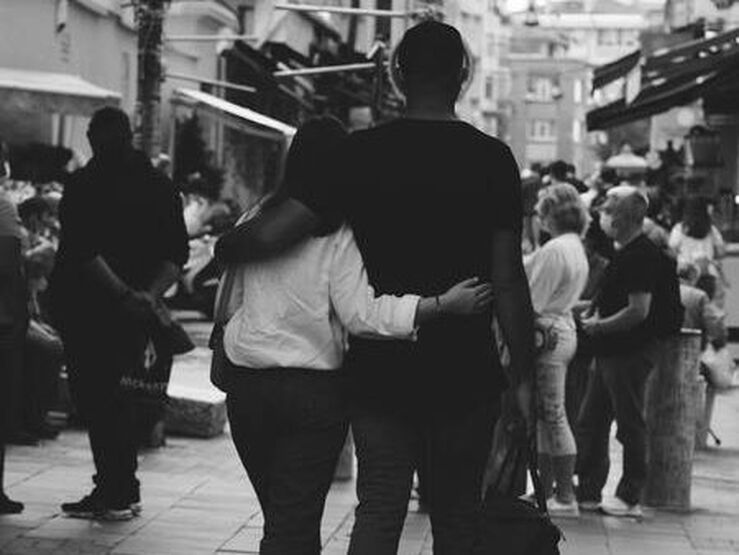|
|
|
In majority white countries, the Black Lives Matter protests that unfolded after the murder of George Floyd were accompanied by the intensification of public debates on systemic racism and white allyship. Some media focused on Black-white couples, discussing the impact of these events on white partners’ understanding of anti-black racism in their Black partners’ lives. As part of the ERC-funded project ‘Regulating Mixed Intimacies in Europe (EUROMIX), over the past four years I have explored Black-white couples’ experiences of racism and discrimination in their everyday lives.
Drawing from ethnographic fieldwork I conducted in 2018-2019, my Identities article, ‘Interracial couples and the phenomenology of race, place and space in contemporary England’, looks at partners’ perceptions of dis/comfort and un/safety across different contexts: when they jointly move in public spaces, choose where to make home, and travel for leisure. By juxtaposing these scenes, the article foregrounds a multi-layered economy of constraint and choice underpinning the lives of the opposite and same-sex couples that I have met and/or interviewed.
My research suggests that race affects partners’ perceptions of whether they are disapprovingly stared at by strangers when jointly moving in public spaces. Indeed, these episodes surfaced more recurrently in white partners’ narratives, whereas many Black and mixed-race partners described moving next to their white partner as generally safer than when on their own. In my article, I interpret this uneven distribution of discomfort as an effect of the phenomenological rupture that entry into an interracial couple provokes in the habitus of whites to move seamlessly in white majority spaces.
I further suggest that gender might also play a role across race. In fact, within heteronormative societies, women are structurally placed in the position of the object of male desire, whose gaze they are mandated to please. As a result, women might have grown more sensitive to third party stares than men, whose aesthetics are less socially scrutinised. This proposition would explain why it was overwhelmingly women who relayed these experiences, and it warrants further empirical exploration. My research also shows that race intersects in multiple and complex ways with other axes of social differentiation in shaping the tactics that interracial couples might adopt to reduce the weight of racism onto their lives. For some, making home in a metropolitan area – one which Luke, a white British man, described as requiring to pass his Black British wife Jade’s ‘criteria [of] sitting in the cafe and counting Black people’ – reflects the desire to nurture their children’s positive racial identity formation. Others, though, prefer majority white neighborhoods: ‘I always feel like where Caucasian people are, their services are better. The schools are better’, explained Vea, a mixed-race Jamaican woman. When planning for holidays, most couples seemingly gauged travel options against their perceived intensity of anti-Black racism in different countries. ‘How are we going to hold ourselves in these spaces? Black people are getting shot left, right and centre across the United States, for nothing,’ fervently said Raya, a white British woman, explaining why she hesitated to go there with her partner Julia, a mixed-race British woman. For the latter, though, it was a country’s prevailing attitudes towards homosexuality that featured as a more prominent constraint to their mobility, as she anticipated having to disguise their same-sex couple status to be ‘respectful of [local] culture’. Overall, my article argues that understanding interracial couples’ perceptions and experiences of racism and discrimination requires consideration of how these might vary based on partners’ different biographies and positionalities. Capturing this complexity matters, I contend, because only by cultivating a nuanced and situated understanding of people’s intersecting privileges and oppressions, including our own, can we nurture and sustain inclusive struggles for social justice.
Blog post by Elena Zambelli, Lancaster University, UK
Zambelli, Elena. Interracial couples and the phenomenology of race, place, and space in contemporary England. Identities: Global Studies in Culture and Power. DOI: 10.1080/1070289X.2021.1993007 [Open Access]
Explore other relevant Identities articles:
Moving racisms, shifting targets: comparing racism experienced by mothers of mixed-parentage children with racism experienced by young people seeking sanctuary in Britain Partnered fathers bringing up their mixed-/multi-race children: an exploratory comparison of racial projects in Britain and New Zealand Desiring the standard light skin: black multiracial boys, masculinity and exotification
0 Comments
Your comment will be posted after it is approved.
Leave a Reply. |
|
Explore Identities at tandfonline.com/GIDE |
|
The views and opinions expressed on The Identities Blog are solely those of the original blog post authors, and not of the journal, Taylor & Francis Group or the University of Glasgow.


